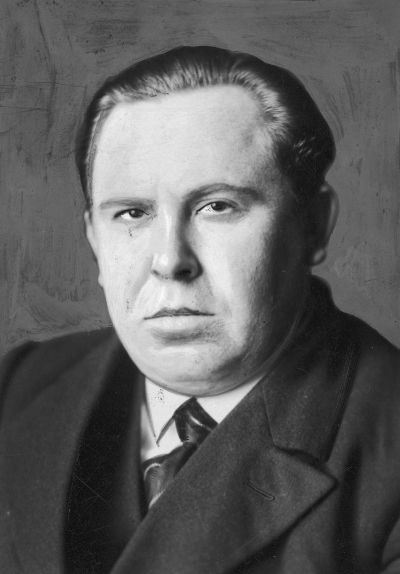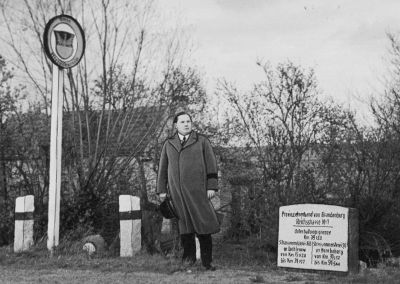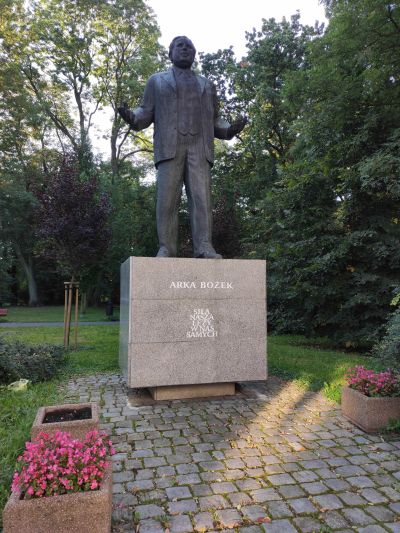Arka Bożek – Polish minority activist in Silesia, politician and publicist

Arka Bożek was born on 12 January 1899 in Markowitz / Markowice (today a district of Racibórz). His parents were Karol Bożek, owner of a medium-sized farm, and Bernardyna née Sławik, daughter of a miller. The Bożek family had lived in Markowice since at least the middle of the 16th century. At home, they spoke the Silesian dialect as well as Polish. Arka started learning German at primary school. Arka’s parents were interested in social affairs and often hosted Polish activists. As a child, Bożek visited Kraków and Jasna Góra (Częstochowa) with his father. However, at that time he was influenced by German culture and the propaganda of the superpowers. Against his parents’ convictions, he joined the Imperial German Army in the spring of 1915. He experienced discrimination in the army because of his origins, which led to him developing a sense of Polish national identity. In the immediate post-war period, Bożek was temporarily aligned with the German left, a move that saw him accused of communism for years. Nevertheless, the principles of social justice remained important to him throughout his life. He related them to the national question: for him, the Polish-speaking Silesians were the exploited people, subordinate to the German capitalists and the administration.
Before becoming politically active in his region, Bożek concentrated on his private life. In late 1918, he took over his father’s farm and married Jadwiga Komor (1900–1992), the daughter of wealthy farmers. His modest, hard-working and selfless wife became a true beacon of strength and a great support for Arka. The couple had three daughters (the first was born in 1922) and a son who died in infancy.
Bożek campaigned publicly during the time of the struggle for the future of Silesia, which heightened tensions between the various population groups. He quickly renounced his involvement in the German left (Spartacus League), which favoured Silesia becoming part of Germany. After finally deciding to support the Polish side, Arka joined the Polish Peasant/People’s Party (Polska Partia Ludowa, PPL), which was founded by the ZPwN in 1922. He won a seat on the Markowice municipal council in the local elections and became known as a gifted orator who knew how to connect with ordinary people. Like many Polish veterans, Bożek joined the Polish Military Organisation of Upper Silesia. He was not involved in the direct fighting during the First Uprising in August 1919, but he took part in blowing up a bridge near Ratibor (Racibórz). In the period leading up to the referendum, he campaigned among the Polish-speaking Silesian Catholics to vote in favour of Poland. During the Third Uprising in 1921, Bożek fought in the ranks of the 4th Infantry Regiment deployed in Racibórz. He commanded a company and organised the medical service. He also tried to keep a check on violence against the civilian population or clashes between the feuding Germans and Poles. The demarcation of the German-Polish border in 1922 placed the Bożek family farm directly at the border on the German side. Despite being at personal risk, Bożek decided to stay in Germany and stand up for the interests of the Polish minority. He became a member of the PPL election committee and campaigned in favour of Polish candidates for Prussian and German parliaments.
Bożek was also involved in the activities of the Association of Poles in Germany (Związek Polaków w Niemczech, ZPwN), which was founded in the summer of 1922. He initiated the establishment of a local group in his hometown of Markowice and also supported the founding of other local groups. In 1924 he became a member of the Council of District I of the ZPwN and was also delegated to the ZPwN Congress in Berlin in the summer of the same year. Despite his young age and some controversy over his youthful involvement in the extreme left-wing movement, he gradually consolidated his position. He was valued for his boldness, his perseverance, his civic courage and his ability to connect with people. Between 1927 and 1930, Bożek was deputy chairman of District I of the ZPwN, and from 1930 secretary of the board. He made efforts to establish direct contact with local members, travelling to the region on numerous occasions. He was also involved in the scout movement, in education (he was chairman of the Union of Polish School Associations in the Opole region), in agricultural circles and in many other cultural and economic initiatives, such as the Upper Silesian Agricultural Association. Bożek’s high esteem in Polish circles was reflected in the fact that he even became one of the two representatives of the Polish minority in the Mixed Commission for Upper Silesia. This commission had been set up by the Geneva Convention (also: German-Polish Agreement on Upper Silesia of 15 May 1922) and met in Katowice. His speeches and interventions often proved effective, even though he had no formal education in most of the issues he dealt with, especially not in law. However, he was a talented autodidact who constantly sought to develop his knowledge. Bożek soon published numerous journalistic texts that were printed in Polish magazines in Germany.







